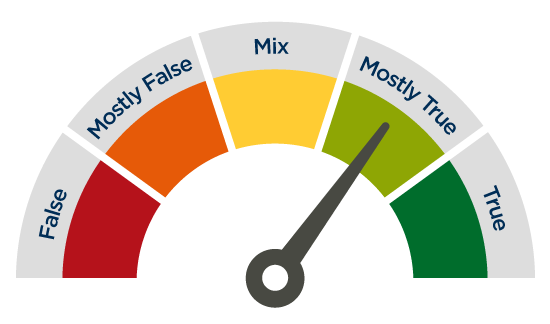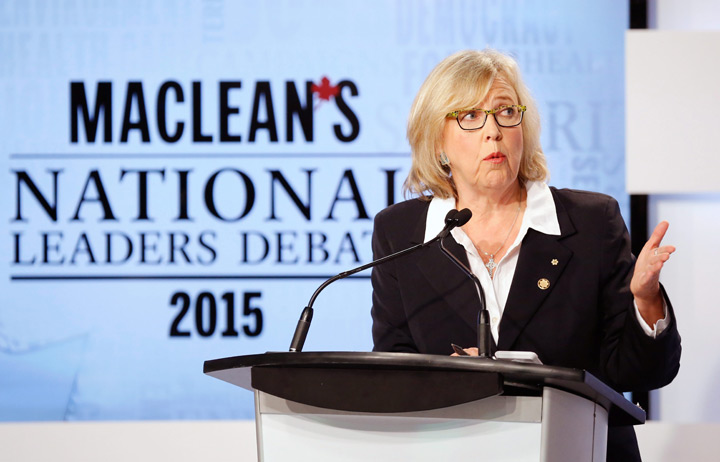Green Party leader Elizabeth May questioned Conservative leader Stephen Harper’s record on the economy, energy and the environment at Thursday night’s election debate.

It led to a memorable exchange between the two leaders, with an interjection by Liberal leader Justin Trudeau, about whether carbon emissions have grown or fallen over the years, as the entire economy grows.
“Not only do we take both the economy and the environment seriously; we are the first government in history to reduce greenhouse gas emissions while also growing our economy,” said Harper. May immediately replied, “That’s not true.”
Later on, May elaborated:
“With all due respect, Mr. Prime Minister, the only way you can take credit for the emissions drop, which only occurred in 2008 and ’09, is the global financial crisis. That’s the only thing that brought down our emissions. They would have gone up much more than they have now if not for the action of Ontario in shutting down coal-fired power plants, and British Columbia in bringing in a carbon tax. The cold, cruel reality is that, under your watch, greenhouse gases have been rising, carbon pollution has been rising. As soon as our economy began to recover in 2009, straight up line. Straight up.”
Harper replied, “Well, greenhouse gas emissions have actually gone down, and the economy has actually grown. Those are the facts.”
So, is Harper right? Yes, but May might be too.

After Harper took power in 2006, greenhouse gas emissions by the end of the year were at 740 megatonnes according to Environment Canada. In 2013, the most recent year available, they were at 726 megatonnes. So, that’s a drop of about 2 per cent over seven years.
But, as May noted, the only drop came in 2008 and 2009, right as Canada entered a recession. As the economy recovered, so did emissions, which grew slowly but steadily from 2010-2013. Not quite a dramatic “straight up” line as May suggests, but they definitely rose since the last recession.
Source: Statistics Canada, Environment Canada.
Note: GHG emissions numbers are calculated annually. For display purposes, they have been put in December of each year in this chart.
Would emissions have risen more if Ontario hadn’t shut down its coal plants? It seems likely, all other things being equal. In an emailed statement, Ontario’s environment ministry told Global News that eliminating coal-fired electricity generation in the province has saved up to 30 megatonnes of emissions annually, compared to 2003 levels. The last coal plant shut down in 2014.
- Foreign nationals can no longer apply for work permits at the U.S.-Canada border
- Judge finds no documentation to support Global News reporting on Han Dong allegations
- Is bilingualism a ‘myth’? Poll shows divide between Quebec, other provinces
- NATO allies appear to have chosen their next leader ahead of summit
Similarly, B.C. phased in its carbon tax between 2008 and 2012. A 2014 climate progress report put out by the B.C. government stated that the province met its goal of reducing greenhouse gas emissions by 6 per cent between 2007 and 2012 – though this could also be somewhat attributed to the recession. The report does note that the fact that emissions have remained “relatively stable” since the recession is a positive sign. There were other climate policies besides the carbon tax during that time period though.
Did the economy grow?
Harper claims that the economy grew over the same time period as emissions fell. Looking at the GDP, this is true. In May 2006, the real GDP was about $1.4 trillion. In May 2015, the most recent month available, it was $1.6 trillion.
It only fell twice during Harper’s tenure: during the 2008-09 recession, and less dramatically, since January 2015. But overall, the real GDP has increased significantly.
And was the Harper government the first government in history to reduce emissions while growing the economy? Well, emissions fell from 756 megatonnes in 2003 to 749 megatonnes in 2005, while Paul Martin was prime minister (the election was held in January 2006, so most of 2006 was under Harper’s tenure). And, the GDP climbed steadily during that time. If you count Martin’s Liberal government as separate from Chretien’s Liberal government, as most people would, then Harper’s Conservatives are not the only government even in recent Canadian history to reduce emissions while growing the economy.



Comments